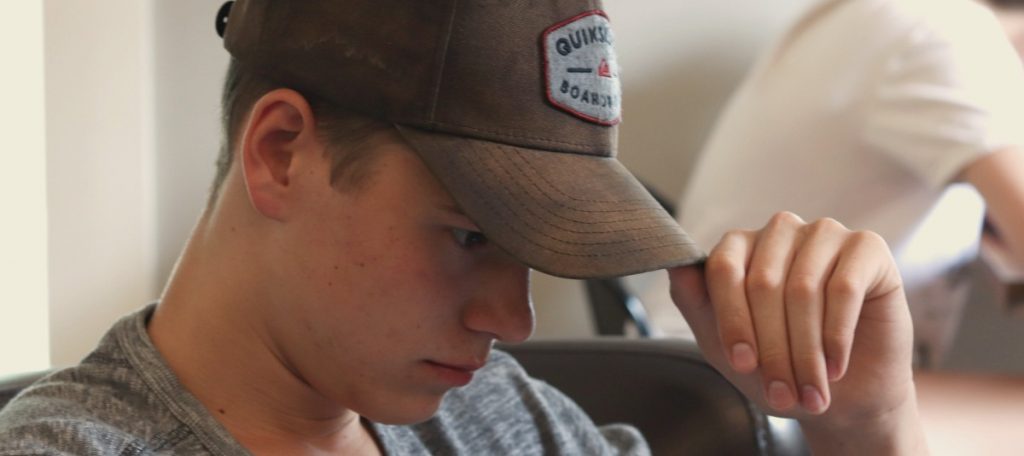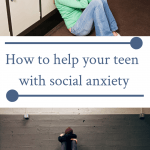
Up until seventh grade, my son loved school. He got along well with other kids, played sports, and seemed happy.
We knew something was wrong the first week of junior high school. Six elementary buildings fed into his school and he barely recognized anyone in his classes. He seemed panicked each morning and sullen each night.
We tried to coach him through a few scenarios at home to help him manage the transition. We gave him some ideas on how to talk to other kids and encouraged him to sign up for a few after school activities.
But things went from bad to worse.
He started avoiding things he once loved, like baseball and scouts. He appeared panicked when we dropped him off at school events, even if he was with a friend. His grades slipped downwards, and he would not talk to his teachers, who reported that he was not participating in class.
There were a few physical symptoms as well. He complained of stomach aches at night and nausea in the morning. He wasn’t sleeping great. Sometimes he appeared erratic or inconsolable.
By the second semester of 8th grade, we knew we were dealing with a major problem. That was when we discovered our son had social anxiety.
Social anxiety can be debilitating, especially in adolescents
While it’s normal to feel nervous in some social situations. social anxiety disorder, also called social phobia, is when everyday interactions cause significant anxiety, self-consciousness, and embarrassment because you fear being scrutinized or judged negatively by others.
For teens and tweens with developing brains, raging hormones, and changing bodies, social anxiety can develop quickly and disrupt their lives. In some extreme circumstances, the severe stress can affect relationships, daily routines, work, school, or other activities.
As an adult, it can be a bit easier to understand and recognize the signs of social anxiety. When it comes to your teen, it’s important to help them deal and understand those feelings and emotions.
Social anxiety disorder can be a chronic mental health condition, When behavior turns from nervousness to avoidance with accompanying physical symptoms, it’s time to seek help from a qualified medical professional or mental health therapist. There are a multitude of coping skills and medications that can help a person manage and improve their ability to interact with others.
Signs and symptoms of social anxiety disorder
According to the Mayo Clinic, the signs and symptoms of social anxiety disorder can include constant:
- Fear of situations in which you may be judged negatively
- Worry about embarrassing or humiliating yourself
- Intense fear of interacting or talking with strangers
- Fear that others will notice that you look anxious
- Fear of physical symptoms that may cause you embarrassment, such as blushing, sweating, trembling or having a shaky voice
- Avoidance of doing things or speaking to people out of fear of embarrassment
- Avoidance of situations where you might be the center of attention
- Anxiety in anticipation of a feared activity or event
- Intense fear or anxiety during social situations
- Analysis of your performance and identification of flaws in your interactions after a social situation
- The expectation of the worst possible consequences from a negative experience during a social situation
How to help your teen with social anxiety
If you cannot get professional help, there are ways you can help your teen cope with social anxiety issues.
Help your teen understand exactly what social anxiety means
Your teenager has probably heard that term before, but may not understand how it applies to their situation. Some teens feel that they are social or because they have a group of friends, they cannot have social anxiety. Others think they just aren’t good enough.
It’s important for teens to understand the symptoms they have and how they may be impacting their physical and mental health. Discuss how their feelings and reactions may be outside “typical” range and negatively affecting their well-being. Talk about how there are ways to help these reactions and that they are the result of a disorder and not because they are weak or bad.
Talk to your teen about taking time to themselves when in social situations
We’ve all been there, right? At a gathering with a ton of people and then suddenly, that feeling of claustrophobia starts to sit in, or the room just suddenly feels very heavy and almost “out” of air. It’s those moments that are triggering feelings of social anxiety. Give your teen those examples and see if they can relate.
If you can give them real-life examples, it may be easier for them to process and understand. The next point to make after giving those examples is to then let them know that it’s perfectly fine to take some “alone” time, even at social gatherings. This can be as simple as going to the restroom alone or taking a short walk outside to get some fresh air to compose themselves. Anything that they can do that is safe, and that will get them some space to calm their emotions a bit is always a good idea in terms of anxiety.
Let your teen know that they aren’t alone
Having social anxiety is quite common. People tend to feel this way when they’re in a large group or in an unfamiliar setting surrounded by people they don’t know. Sometimes, the feeling is faint and is easy to overcome, and other times it takes a bit more time and effort.
The one thing that you need to truly communicate for certain to your teen about social anxiety is that they aren’t alone or wrong in their feelings. Anxiety is a natural response that is genetically wired into our DNA. Focus on the end goal in helping them manage it.
Validate their feelings.
Don’t downplay the feelings that your teen is having when it comes to social anxiety. If their feelings are strong about not wanting to go somewhere or do something, then you should discuss it to see if it makes sense for them to attend that specific event. It’s also important to help them to discuss what-if scenarios and role play to help them manage their social anxiety leading up to an event.
Help them face their fears with boundaries and a safety net
While your teen’s instinct will be to avoid social situations that cause discomfort, it is important to help them conquer their fears. The more they realize they can survive challenging situations, the more confidence they will gain.
That doesn’t mean, however, forcing your teen to participate in things they don’t want to do. Instead, find a few activities they enjoy, and then set time limits, so they know that they will not be stuck indefinitely in an uncomfortable situation.
For example, if they go to a school event, let them know you will pick them up at a certain time unless you hear from them that they want to stay longer. Let them have a new friend over at their house first so they can feel more comfortable. Have a code word they can text you at any time in the instance they can’t control their emotions.
Structure and routine often wanes during the teenage years, but incorporating time limits and safety nets into social situations can give some control back to an anxious teen.
Find and help them use coping mechanisms
Helping your teen deal with social anxiety in adolescence can help minimize the impact they have on their lives as adults. Breathing exercises can help your child stay calm and centered.
There are many different strategies to help your teen deal with social anxiety. Breathing exercises can help your child stay calm and reduce stressful feelings. Simply going to the restroom, closing their eyes, and breathing to the count of ten may reduce the negative self-talk they are experiencing.
Other tactics include practicing mindfulness, incorporating positive affirmations into daily use, and focusing on building your teen’s self-esteem.
Facing your fears
While your teen’s instinct will be to avoid social situations that cause discomfort, it is important to not their fears win. The more they realize they can survive challenging situations, the more confidence they will gain.
That doesn’t mean, however, forcing your teen to participate in things they don’t want to do. Instead, find a few activities they enjoy, and then set time limits so they know that they will not be stuck indefinitely in an uncomfortable situation.
For example, if they go to a school event, let them know you will pick them up at a certain time unless you hear from them that they want to stay longer. Let them have a new friend over at their house first so they can feel more comfortable. Have a code word they can text you at any time in the instance they can’t control their emotions.
The goal is to encourage them to participate in life, but in a safe and non-threatening way.
Learning to live with social anxiety
Talk to them about the signs that they should be aware of for social anxiety and give them positive feedback and reinforcement about ways that they can combat it.
You may find that they start taking baby steps to combat those feelings of social anxiety, but every step they take forward is one step closer to overcoming it!
Parenting Teens and Tweens is Tough, Want A Little More Support?
Is it more than just normal teen anxiety; when to seek medical advice
How to Talk to Your Teen About Anxiety and Stress







Leave a Comment